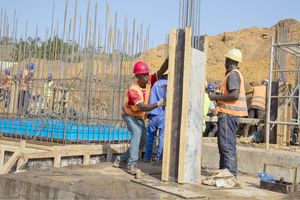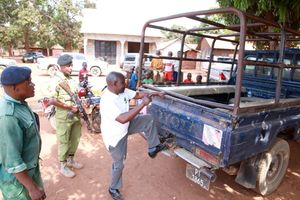Prime
Funding crisis threatens voluntary repatriation of Burundian refugees

A handout picture taken on October 7, 2015 and released a week later by Oxford Committee for Famine Relief shows Burundian refugees walking to Nduta refugee camp in Kigoma, northwest Tanzania. PHOTO | OXFAM | AFP
What you need to know:
- The government has underscored the gravity of the situation, emphasising that each Burundian refugee, including children, requires $200 for a successful return to their home country.
Morogoro. Voluntary repatriation of Burundian refugees is severely threatened by the dwindling allocation of funds allocated for refugee services, The Citizen can report.
The government has underscored the gravity of the situation, emphasising that each Burundian refugee, including children, requires $200 for a successful return to their home country.
Assistant director of the refugee services department at the Ministry of Home Affairs, Nsato Marijani, voiced his concern during a capacity-building workshop for journalists on refugee protection held in Morogoro on Friday.
“We have many Burundian refugees with families in the repatriation plan, but the ongoing dwindling funds make it difficult to accomplish the mission,” said the Commissioner of Police.
“The situation needs to be treated as a matter of urgency due to its humanitarian nature. It involves the lives of human beings who need to be taken care of,” he added.
Commissioner Marijani highlighted the strain facing the United Nations High Commissioner for Refugees (UNHCR), specifically its dedicated fund for refugees’ welfare.
The World Food Programme’s (WFP) recent announcement of slashing food rations for refugees in Tanzania further exacerbates the crisis, which is likely to derail the repatriation plan and service provision for remaining immigrants.
Mr Marijani rightly pointed out that a lack of funds not only jeopardises repatriation but also hampers the influx of refugees’ management in a world rife with conflicts, mentioning the Democratic Republic of the Congo (DRC) as another area of concern in the region.
“With the growing funding concern within UNHCR, the repatriation exercise is likely to be affected,” he noted.
He emphasised the vital role of funds in the repatriation process, noting that they “incentively carried countries of origin in order to get things moving.
The voluntary repatriation process is guided by the 2001 tripartite agreement between UNHCR, Tanzania, and Burundi.
It has been crucial for refugees seeking to return home with tripartite commission, recognising the generosity of the Tanzanian people, reaffirmed its commitment to facilitate the repatriation of refugees who choose to return home voluntarily.
UNHCR, working closely with the Tanzanian and Burundi governments, has facilitated the voluntary return of over 20,000 Burundian refugees in 2021.
“Shrinking of funds puts at risk the sustainability of the repatriation process, potentially leaving refugees stranded in Tanzania for years,” said Prof Khoti Kamanga from the School of Law at the University of Dar es Salaam.
However, a growing number of global events, such as the United Nations peacekeepers’ accelerated withdrawal from the DRC, pose another threat.
The security situation, worsened by ongoing conflicts such as the Russia-Ukraine and Hamas-Israel wars, has diverted the direction of aid that would benefit refugees.
The recent influx of 12,000 asylum seekers from the troubled Democratic Republic of the Congo (DRC) to Tanzania adds another layer of complexity.
However, Mr Marijani warns: “When such a situation happens, every country prioritises individual interests.”
The accelerated withdrawal of UN peacekeepers from the DRC may lead to an increased number of people seeking asylum in Tanzania, therefore exacerbating the funding crisis.
In light of these challenges, Commissioner Marijani urged African nations to develop their own modalities of dealing with victims of conflicts and asylum without complete reliance on donors’ aid.
He argues that self-sufficiency will better equip African countries with the capability to efficiently handle crises.
According to him, the funding crisis that threatens the provision of services to refugees in Tanzania demands immediate attention from the international community.
“The potential derailment of the voluntary repatriation process for Burundian refugees underscores the urgency of finding sustainable solutions,” human rights expert Dr Abineri Msajigwa said during an interview.
“The world must not turn a blind eye to the plight of refugees, as concerted efforts are needed to ensure the success of voluntary repatriation initiatives and the overall well-being of those seeking refuge in Tanzania because, with the situation, people will keep seeking asylum,” added Dr Msajigwa.
Currently, Tanzania is home to more than 240,000 refugees from the DRC and Burundi, according to officials.
Senior protection officer at the UNHCR, Boniface Kinyanjui, said due to the lack of budget, they are making strategies to reduce non-essentials.
“Until now, we have been lobbying to increase the budget, but for this year, for those who are scheduled to return, their budget is available,” he said.
Despite not mentioning the number of refugees who will leave this year, he said every month they repatriate 1,200 refugees.
Explaining the reason for the decrease in the budget, Mr Kinyanjui said it is the increase in war incidents in the world when the donors remain the same.
“We are doing everything possible with the existing budget by reducing other non-essential things in order to serve people’s lives, because the basic thing is to save people’s lives,” he said.





